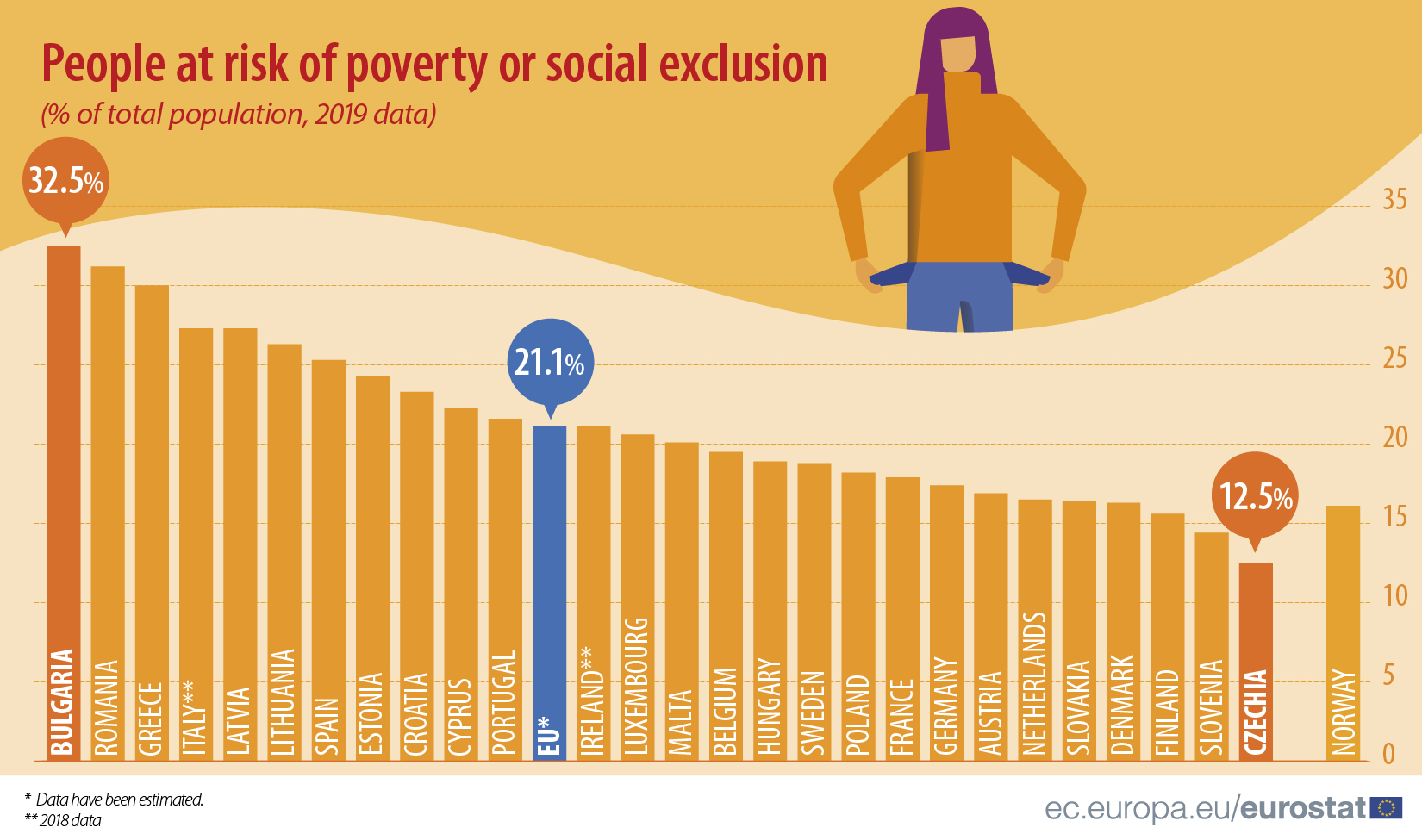In 2019, 21.1% of the population in the European Union (EU), equivalent to 92.4 million people, were at risk of poverty or social exclusion, slightly down from 2018 (21.6%).
These data on poverty and social exclusion in 2019, the year before EU Member States introduced the measures against the spread of COVID-19, will serve as one of the benchmarks for analysing the economic and social impact of the COVID-19 pandemic in 2020.
Highest at risk of poverty or social exclusion rate in Bulgaria, lowest in Czechia
More than a quarter of the population was at risk of poverty or social exclusion in seven Member States in 2019: Bulgaria (32.5%), Romania (31.2%), Greece (30.0%), Italy and Latvia (both 27.3%, 2018 data for Italy), Lithuania (26.3%) and Spain (25.3%).
In contrast, the lowest shares of persons being at risk of poverty or social exclusion were recorded in Czechia (12.5%), Slovenia (14.4%), Finland (15.6%), Denmark (16.3%), Slovakia (16.4%), the Netherlands (16.5%) and Austria (16.9%).
About 1 in 6 persons in the EU at risk of income poverty
In 2019, 16.5% of the EU population were at risk of poverty after social transfer (income poverty), down from 16.8% in 2018. Income poverty describes the proportion of individuals living in a household whose disposable income is below the national at risk of poverty threshold. As the thresholds reflect actual income distribution in the countries, they vary greatly both between Member States and over time.
Among the EU Member States, more than 1 in 5 persons were at risk of income poverty in Romania (23.8%), Latvia (22.9%), Bulgaria (22.6%), Estonia (21.7%), Spain (20.7%), Lithuania (20.6%) and Italy (20.3%, 2018 data). At the other end of the scale, the lowest rates were observed in Czechia (10.1%), Finland (11.6%), Slovakia (11.9%), Slovenia (12.0%), Hungary (12.3%), Denmark (12.5%), the Netherlands (13.2), Austria (13.3%) and France (13.6).
1 in 17 persons in the EU severely materially deprived
5.6% of the EU population were severely materially deprived in 2019, meaning that their living conditions were seriously affected by a lack of resources such as not being able to afford to pay their bills, keep their home adequately warm, or take a one week holiday away from home. This proportion has decreased compared with 2018 (6.1%). The proportion of those severely materially deprived in 2019 varied significantly among Member States, ranging from 19.9% in Bulgaria, 16.2% in Greece and 14.5% in Romania to less than 3% in Luxembourg (1.3%), Sweden (1.8%), Finland (2.4%), the Netherlands (2.5%) and Denmark, Germany, Austria and Slovenia (all 2.6%) as well as Czechia (2.7%).
About 1 in 12 people in the EU lived in households with very low work intensity
In 2019, 8.5% of the population aged less than 60 years in the EU lived in households where the adults worked less than 20% of their total work potential during the past year. This proportion was lower compared with 2018 (8.8%). Greece (13.8%), Ireland (13.0%, 2018 data), Belgium (12.4%), Italy (11.3%, 2018 data), Spain (10.8%), Finland (9.7%), Bulgaria and Denmark (both 9.3%) as well as Croatia and the Netherlands (both 9.2%) had the highest proportions of those living in very low work intensity households, while Czechia (4.2%), Poland (4.7%), Malta (4.9%), Hungary (5.0%), Slovenia (5.2%) and Estonia (5.4%) had the lowest.
These data come from the 2019 results of the EU-Statistics on Income and Living Conditions (EU-SILC) survey.
Source datasets: ilc_peps01 (at risk of poverty or social exclusion), ilc_li02 (at risk of poverty rate after social transfers), ilc_mddd11 (severe material deprivation) and ilc_lvhl11 (low work intensity)
For further information, see the Statistics Explained article Living conditions in Europe - poverty and social exclusion. An infographic is also available on the Eurostat website.
This news item marks the International Day for the Eradication of Poverty (17 October).
Note: The European Union (EU) includes 27 EU Member States. The United Kingdom left the European Union on 31 January 2020. Further information is published here.
To contact us, please visit our User Support page.
For press queries, please contact our Media Support.


